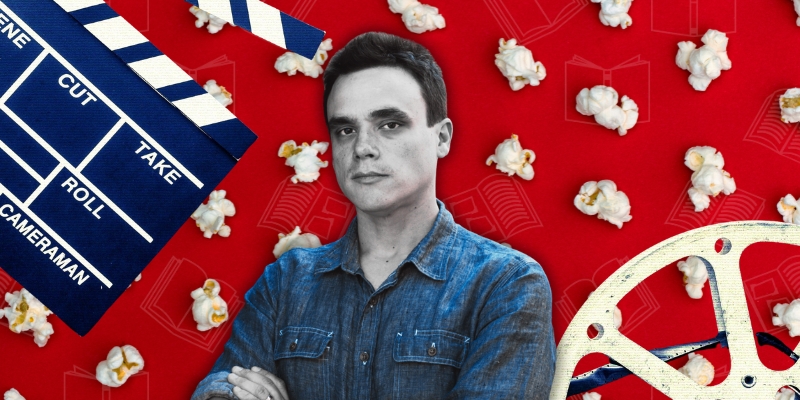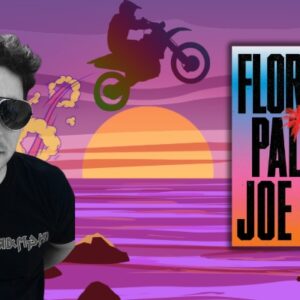You can often tell when a crime-fiction author has read Jordan Harper’s She Rides Shotgun, which won the Edgar Award for Best Debut Novel in 2017. Mention the title, and chances are good they’ll start enthusing about the language, the plot, the realness of the characters. You might even catch a glint of jealousy in their eyes as they’re speaking—Damn, it’s one of those novels I wish I’d written.
Now the book’s on the verge of finding a much wider audience, thanks to a film adaptation starring Taron Egerton and Ana Sophia Heger as (respectively) ex-con Nate McClusky and his daughter Polly, who are on the run from the police and a gang called Aryan Steel. The setting is California’s underbelly, a seemingly endless sprawl of dirtbag motels and meth labs and prisons and diners, where all decisions are hard, and death is always millimeters away.
The novel’s underlying theme—father does his best to protect his offspring in a brutal world, often at enormous cost—is a timeless one, and Harper had a specific inspiration. “I don’t remember exactly when I came upon the idea for the book, only that it came directly from one of my many rewatches of the amazing film Shogun Assassin,” Harper says. “I carried around the idea of updating that story for modern times for a while.”
At the time, Harper was writing for the television show The Mentalist, a procedural drama that starred Simon Baker as a fake psychic turned police consultant. He’d self-published a short story collection, American Death Songs, which his agent thought would sell to an actual publisher.
“He asked me to write a two-page description for a novel so we could try and market the collection in a two-book deal,” Harper says. “So, I wrote a quick description for the novel, then called Ride or Die.” When the short story collection sold to Ecco Press, Harper found himself on the hook to write the novel.
Writing for television may have made him an outliner and a plotter, but he still composed She Rides Shotgun (which underwent a number of additional title changes, including “Greenlight” and “If All Roads Were Blind”) out of order, starting with a chapter in which Polly fights a dog. (As his subsequent novels grew larger, he would rely on another television-writing technique: employing a writers’ room assistant to help him organize the interconnected plot threads.) Then he ran into a challenge, one that might have derailed a writer of lesser fortitude.
“I remember this very clearly: I printed the whole book out using the office printer and sat on the floor to read it,” Harper says. “At this point, the book was told ninety percent from Nate’s point of view. And I realized very quickly, maybe by page thirty, that for the book to work, it had to be told from Polly’s POV.”
That was a depressing revelation, to put it mildly, and Harper left the pages on the floor of his office, untouched, for more than a month. When he went back to work, he kept the plot while rewriting virtually every page. “And I think that is a key moment in my development as a writer,” he adds. “I’m glad to have had the courage to go back and rewrite the novel from a perspective I had been frightened to tackle at first. And that’s why the book works. Polly.”
After She Rides Shotgun won the Edgar, Harper went on to publish other novels set in the same gritty California milieu, including The Last King of California (biker gangs, wildfire, family trauma) and the sprawling Everybody Knows (the depraved evil of Hollywood’s rich and famous).
Like many authors, he remains fiercely proud of his first novel. “At the core of all of my work there is a deep empathy for my main protagonists—I can’t imagine writing a book where I looked down on the people I write about, especially the ones whose heads we are allowed to peer into,” he says.
“And [She Rides Shotgun] also develops the themes that I continue to write about (and, I suspect, I always will). All of my books are about love, death, power, and finding out how to live with yourself in this violent, gorgeous country of ours.”
His current manuscript, a sequel to Everybody Knows, is titled A Violent Masterpiece. His desk is stacked with books by JG Ballard, S.E. Hinton, Freud, Jim Thompson, “a dope old paperback of Red Harvest,” and the complete lyrics of Lou Reed. No matter how good your prose, and whether or not you want to write novels or screenplays or some combination of both, you need to constantly absorb other folks’ work.
“I’m a black belt in writing fiction and writing television scripts because I’ve put the time in,” he says. “I’ve written maybe twenty produced episodes of television, and helped break literally hundreds more. I’ve also written four novels and a bunch of short stories. I did the work in both fields. You gotta do the work.”
*
It’s one thing for an author who’s never written a screenplay to adapt their own work for the screen—chances are pretty good it’ll be like someone attempting to trim a rose with a chainsaw. But Harper has the right experience, and he wrote the first drafts of the She Rides Shotgun screenplay alongside the writing team of Ben Collins and Luke Piotrowski.
Even with his extensive television credits, it wasn’t an easy task to take his novel and break it into another format. “You shouldn’t adapt yourself for the same reason you shouldn’t operate on yourself,” he says. “You have to be able to make cuts without pain.” Even if many of the rules for stories are universal, books need to lose something to become movies.
Maybe that’s why so many authors hate how Hollywood treated their novels—James Ellroy, for whom Harper has a well-documented love, once referred to L.A. Confidential, the 1997 movie adapted from his historical crime epic, as a “turkey of the highest form” (although he held back his criticisms until the death of Curtis Hanson, the film’s director).
Even if many of the rules for stories are universal, books need to lose something to become movies.Harper has no plans to adapt himself again; there’s a film version of Everybody Knows in the works, but with another writer adapting it.
“The other reason for writers to avoid working in Hollywood,” Harper says,
and this has nothing to do with the She Rides Shotgun movie and everything to do with my career in television, which I am currently trying to drown in the bathtub: there’s no reason for a novelist to expose themselves to the cheap greed and loathsome brainworms of so many Hollywood executives.
Go write books, and keep your skull clean.

















